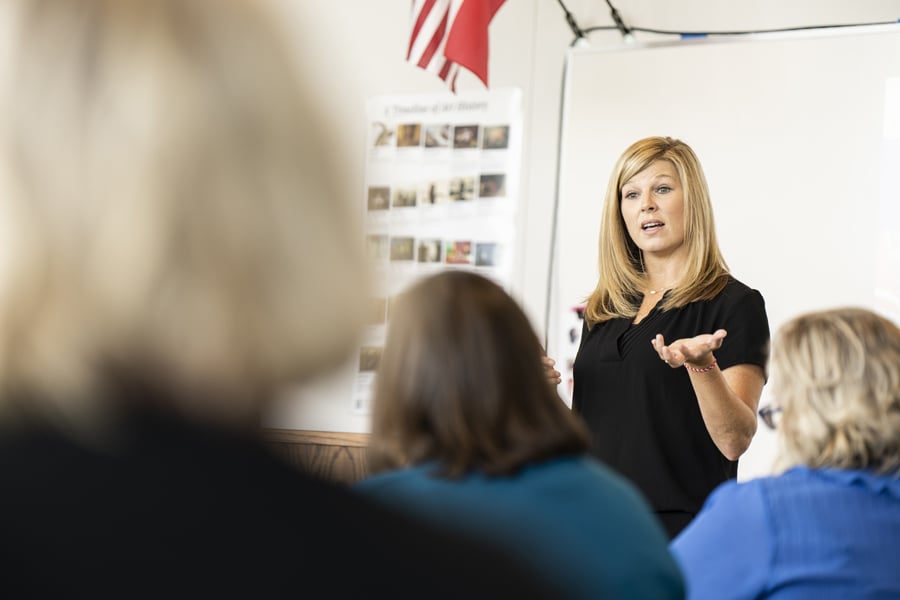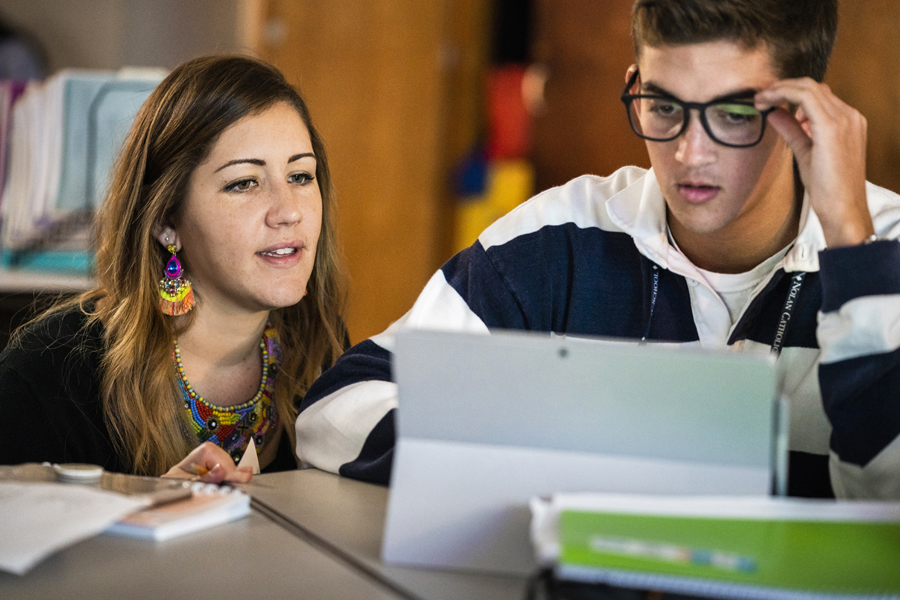Making a greater impact on students: learning specialists in Catholic schools

Diocesan Learning Specialist Jennifer McNulty leads a workshop for principals on July 22 at Nolan Catholic High School. (NTC/Juan Guajardo)
More students in diocesan Catholic schools will receive the tools they need to succeed, thanks to a $204,000 grant from the Advancement Foundation.
The funds, which come from the Annual Diocesan Appeal, will hire two new dyslexia therapists for the 2021-22 school year and will train six diocesan teachers to help children with dyslexia — both part of a three-year plan to have trained dyslexia teachers on every campus in the diocese.
“We’re able to identify students that have learning difficulties and want to provide appropriate learning support to meet their needs,” said Melissa Kasmeier, Interim Superintendent of Catholic Schools.
Diocesan Learning Specialist Jennifer McNulty agreed, “Across the board — not just in private schools but in public schools, too — the identification of students with learning differences has more than doubled in the last decade.”
In the most recent round of grant requests to the Advancement Foundation, several schools in the diocese requested funds for learning support specialists, said Renée Underwood, Chief Development Officer for the Catholic Diocese of Fort Worth Advancement Foundation.
Underwood said she reached out to Kasmeier to see if the foundation’s resources could be pooled to impact more campuses. As it turned out, Kasmeier and McNulty were already working on getting training for a group of diocesan teachers to become learning support coordinators and certified dyslexia therapists.
“We realized we could make a greater impact for all our schools, not just a few,” Underwood said.
The proposal to use funds for learning support coordinators and training current teachers received “an overwhelmingly positive response” from both the grant committee and the foundation board, Underwood said.
“We’re using this money to invest in the future success of our students,” she said.
Learning Support specialists are “a gamechanger”
While several diocesan schools have learning support specialists already on staff, 13 of 17 campuses still have a need for a dyslexia therapist, McNulty said.
The grant will fund two additional dyslexia therapists to share between schools and will pay for six teachers to receive dyslexia training at Key School, a private school in Fort Worth with a mission to serve students with learning differences.
The training is a two-year program to certify teachers as dyslexia therapists.
It’s estimated that one in five students in the U.S. have learning and thinking differences like dyslexia and ADHD, McNulty said. Adding more therapists is key, but training teachers to identify students with language-based challenges like dyslexia (primarily reading) and dysgraphia (primarily writing) is also of high importance, she said.
McNulty also wants to provide professional development for teachers in the diocese to discover new ways to engage all students.
“How do we continue to help teachers to grow and differentiate in the classroom?” she said. “You can’t look at the classroom as a whole. You have 20 to 25 individuals who all have different needs.”

Ana Nieves, learning specialist at Nolan Catholic High School, helps a student with homework while sharing studying tips in this 2019 photo. (NTC/Juan Guajardo)
Lisa Tovar said that having a learning specialist available “made all the difference in the world” for her son Matthew, who graduated from Nolan Catholic High School this year and is enrolled at the University of the Incarnate Word in San Antonio.
Matthew deals with dyslexia and ADHD. Working with Ana Nieves, Nolan’s director of learning support and academic coach, was “a gamechanger,” Tovar said.
Nieves helped Matthew succeed at Nolan and assisted him in locating similar support services at Incarnate Word, where he is a freshman this fall.
Tovar also praised Nolan Principal Leah Rios for her passion and vision in supporting students with learning differences.
A multi-year plan
Kasmeier said that the grant for learning support services is part of a three-year plan to help all students reach their full potential in the classroom.
In year two, the goal is to train four reading intervention teachers, engage the teachers training as dyslexia therapists to work practicum hours on campuses, and hire learning support coordinators. Learning support coordinators will help children get the assistance they need, communicate with teachers and parents so they can collaborate, and support professional development and coaching.
In year three, a grant would support the trained diocesan dyslexia therapists who would be shared between schools, have the teachers training in reading intervention work with small groups, hire part-time or full-time counselors to support the social and emotional needs of students, and continue to develop and implement enrichment strategies for accelerated learners.
“We want to increase awareness and identification of students who have a need,” Kasmeier said, “We also want to increase the number of those who are equipped to help.”
The Advancement Foundation grants are fulfilling a critical need, McNulty said, as tuition currently doesn’t cover the additional learning support needs.
Underwood said that the Advancement Foundation exists to support parishes, schools, and ministries in the diocese and to raise funds in the Annual Appeal for Bishop Michael Olson’s greatest priorities, which include supporting clergy and seminarians, serving the poor, and strengthening Catholic education. The foundation manages endowments for parishes, schools, and ministries, along with funds from the Annual Appeal.
“We want to carry out the mission of Jesus Christ for the parishes in our 28 counties,” Underwood said.
